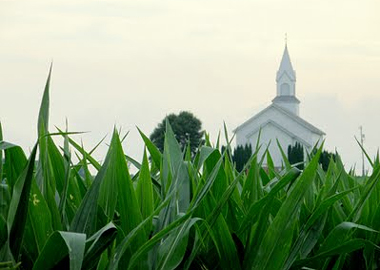“I prefer to think of Iowa as I saw it through the eyes of a ten-year-old boy,” Herbert Hoover, the only Iowan ever elected president of the United States, wrote at the beginning of his memoir. “Those were eyes filled with the wonders of Iowa’s streams and woods, of the mystery of growing crops.”
Having spent my high-school years in Des Moines, I too have fond and nostalgic recollections of Iowa. Although I initially harbored an adolescent’s resentment at having to move from Michigan to what I reviled as “farm country,” Iowa soon won me over with its lovely undulating hills, its strong progressive tradition, its statewide newspaper, the Des Moines Register, and the sturdy values of its citizens.
And no, contrary to the stereotype propagated by those from the coasts who disdain the Midwest as flyover country, Iowa is not flat. Anyone who has ridden RAGBRAI (the Register’s Annual Great Bicycle Ride Across Iowa) knows that the topography of Iowa is definitely not flat. (I’ve done the ride twice, in 1988 and 1992, and I hope to persuade my sons to accompany me the next time around in the not-too-distant future.)
I don’t get back to Iowa as often as I’d like, but I have family there so I return from time to time. Although there is still much to admire in Iowa, much has changed, especially in the realm of politics. And all of this becomes apparent when the Iowa precinct caucuses come around every four years.
The principal difference is the activism of evangelical voters; especially the machinations of the religious right. When I lived in Iowa in the 1970s, my father was pastor of one of the largest evangelical congregations in the state. Although he remained a Republican to his death, my father was resolutely apolitical in the pulpit.
Things began to change for Iowa evangelicals—and for politically conservative evangelicals elsewhere—in the late 1970s. Iowa, in fact, was the proving ground for abortion as a political issue. Until 1978, evangelicals in Iowa (as elsewhere) were overwhelmingly indifferent to abortion, even after the Roe v. Wade decision of 1973; they considered it a Catholic issue.
The Iowa race for United States Senate in 1978 pitted Dick Clark, the incumbent Democratic senator, against a Republican challenger, Roger Jepsen. All of the polling and the pundits considered it an easy win for Clark. In the final weekend of the campaign, however, pro-lifers (predominantly Catholic) leafleted church parking lots all over the state. Two days later, in an election with a very low turnout, Jepsen narrowly defeated Clark, thereby persuading Paul Weyrich and other architects of the religious right that abortion would work for them as a political issue.
Politically conservative evangelicals in Iowa began to mobilize. Ronald Reagan carried Iowa in 1980 over Jimmy Carter, the incumbent, evangelical Democrat. In 1988 I returned to Iowa for the precinct caucuses to write about evangelicals negotiating the vagaries of political life. Many were self-identified “housewives” who were “lobbying from the kitchen table.”
The religious right in Iowa never looked back. Concerned Women for America, Beverly LaHaye’s organization, became a political force. Rush Limbaugh and other fixtures of the downstream media became staples on WHO, Iowa’s Clear Channel radio station. The radio station KWKY, located—literally—in the middle of an Iowa cornfield, became a beacon of evangelical political rhetoric, most of it leaning toward the hard right. Gannett’s purchase of the Register in 1985 diminished the newspaper’s independent voice.
Evangelicals in Iowa formed into megachurches, just as they did in other parts of the country. Homeschooling became all the rage—and this despite the fact that Iowa has long boasted one of the finest systems of public education in the nation.
What emerged is a kind of hothouse. Iowa’s long tradition of progressivism, ranging from Josiah Bushnell Grinnell (for whom Grinnell College is named) and Henry Wallace to Harold Hughes and Tom Harkin, has largely been marginalized, or (some might say) brought to its knees.
As I write this, I realize full well that perceptions about the goings-on in Iowa are skewed by the fact that there is, effectively, no Democratic primary in Iowa this year. Iowa, after all, voted blue in 2008, and his victory in the Iowa caucuses early that year propelled Barack Obama to the Democratic nomination.
This year, however, the campaign rhetoric and the ads are emanating from the right, as the Republican candidates and their wealthy allies seek to outdo one another in demonstrating their conservative credentials. The progressive tradition has rarely been hegemonic in Iowa: for every Henry Wallace there’s a Herbert Hoover, for every Tom Harkin there’s a Charles Grassley.
Still, the shrill voices coming from the hard right in Iowa this year serve as a reminder that the state has changed in the years since I left. The rise of the religious right, with its opposition to gay rights and its advocacy of homeschooling, has created a hothouse and tempered the state’s proud tradition of progressivism, evident most dramatically in the 2010 recall of three Iowa Supreme Court justices who ruled in favor of same-sex marriage.
For years, I harbored the fantasy of returning some day to Iowa to participate again, and more fully, in its rich progressivism. These days, I’m not so sure.





